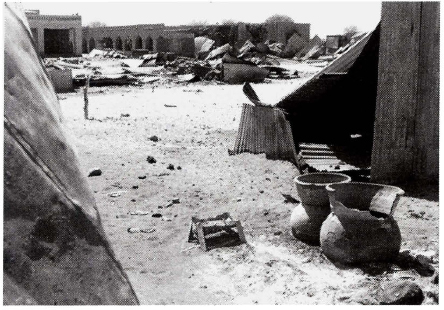

The Rumbek Bookshop
Fly to Rumbek itself. The southern capital of what used to be Sudan, the more famous one is Khartoum. Rumbek is some 373 miles (600 kilometers) to the South West, heading towards Congo and a big swamp.
If Rumbek is a suitably unlikely place for a No Holiday destination, even so, it seems to have had more than its obvious share of media attention. But then Rumbek provides a touch of local color to the story of Sudan, independent since 1956, an otherwise rather dreary tale of the twenty-year-long civil war that has resulted in two to three million deaths.
Rumbek bookshop is a very small shop in a very small town, with a very, very small stock of books. Yet it has some cachet as perhaps one of the most widely reported bookshops in Africa.
“If Jerome K. Jerome were alive today, he would be proud. Over a century after he wrote it, Three Men in a Boat, his quintessentially English comic novel about accident-prone Victorian gentlemen paddling down the River Thames, is a bestseller in southern Sudan.” Or so quipped The Economist in January 2004, under the witless headline: “The people of southern Sudan are starved for reading matter.”

This might seem implausible, the London-based business magazine continues, with a chuckle, as southern Sudan is the scene of Africa's “longest-burning civil war.” Its people have lived for decades “in fear of death or enslavement.” How could they relate to a comedy about chaps in red-and-orange blazers sculling to Hampton Court and getting lost in the hedge maze? Indeed, we might add, not that the paper does, how could they read about it, given only 15 percent of the population of southern Sudan is literate?
Nor does The Economist report that the Commission of Education had in fact supplied 415,000 books to primary schools in southern Sudan the previous year. The first batches of books even went through Rumbek (as well as Maridi) from where they were distributed more widely. They included about 370,000 pupils' books, 40,000 teachers' guides and 7,000 handbooks. And the plan was to increase this to a million books in the subsequent years.
But let's return to The Economist, which has found an obliging “man-in-the-bookshop” to complete the piece. He reveals that he has sold eight books, and five of them were Three Men in a Boat. “People find this book a bit hard to understand... but for now we have to rely on the Ugandan distributors to send us what they think is appropriate.” Doubtless this is intended to strike the reader as rather droll, as is the fact that a friend of the bookseller enjoyed the book so much that he named his goat “Montmorency” after the dog that accompanies its three heroes down the river. A final whimsical observation at the end of the piece claims that Rumbek Secondary, one of the few remaining secondary schools in the south, is considering making Three Men in a Boat a set text this year. But given that the school must have several thousand students, this seems unlikely—unless there are unsuspected truckloads of Jerome K. Jerome heading for Rumbek bookshop.
In 2003, southern Sudan had just 1,700 schools for its 1.4-million school-age children, according to the UN, of which less than a quarter went to school. And just six percent of teachers had any formal training; most are volunteers. When the north-south war flared up in 1983, many of the teachers were obliged to join the armies. Schools became barracks and targets of war, with the result that after the war, the entire system needed to be rebuilt from scratch.
But one problem which financial aid has little effect on is the cultural resistance to the education of female children. Only in Afghanistan under the Taliban were fewer girls given even the most basic education than in Sudan. Girls in Sudan are often considered fit only to do household chores, not to learn, and are obliged to marry at 14. Social structures such as the dowry of cows (which go of course not to the girl, but to her closest male relative) mean that those with other plans are under pressure not only from their fathers but also their uncles and brothers too. Any girl not married by 17 is considered a spinster.
The UN has been setting up new schools, including all-girl schools. At these schools, girls attend classes in the morning, and then go home for the rest of the day to do the chores. Thus keeping one tradition alive.

The bookshop is not risky, but since Bill Clinton's cruise missile strike on Sudan's main medicine factory, visitors must realize that pretty much all of Sudan could be a target.